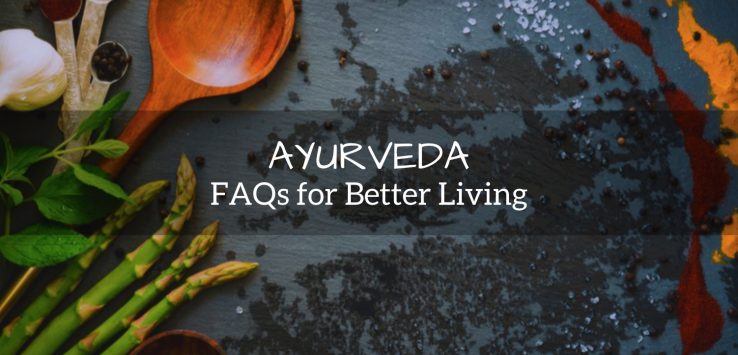- 2Shares
When it comes to a holistic healthcare of an individual, multiple questions surround our minds. So, we start to look out for advice and often start off with the wrong approach. For instance, what are the benefits of yoga and meditation? What foods should one eat for a healthy start? What could be the wrong food combinations? Or how to stay positive throughout? From the oldest surviving treatment systems, how do you get into the intricacies and gather the trustworthy information? From the QnAs (Ayurveda FAQs) below, you can gain insight into how Ayurveda works – as well as how you can use it in your daily life!
Ayurveda FAQs for Better Living
Part 1:
1. What type of water is good to drink upon waking up early in the morning?
Answer – Warm Water
2. What is the best method for drinking water?
Answer – Firmly seated and sip by sip
3. How many times should I chew each bite of my food?
Answer – At least 32 times
4. Which is the best time to eat stomach-full food?
Answer – During the afternoon (lunch)
5. What is the last time that I can have my breakfast at?
Answer – Until 2 and a half hours after sunrise
6. What should I drink with my breakfast?
Answer – Not coffee, but fresh juice
7. What should I drink while having lunch?
Answer – Lassi/ buttermilk
8. What can I drink with my dinner?
Answer – Milk
9. What time shouldn’t I consume citrus fruits?
Answer – At night
10. Can I eat ice creams?
Answer – Certainly not!
Part 2:
11. After how long should I eat something that’s out of the fridge?
Answer – After 1 hour
12. Should I drink cold drinks?
Answer – No
13. Till what time (maximum) can I consume the cooked food?
Answer – Until 40 minutes
14. What quantity of food should I eat at night?
Answer – Make dinner as light as possible, so almost half of what you ate at lunch.
15. At what time should I have my dinner?
Answer – Before sunset
16. Can I drink water before or after eating?
Answer – Before or after 40 Minutes (minimum)
17. Can I drink lassi/buttermilk at night?
Answer – No
18 Can I sleep after having breakfast?
Answer – You should glide into your routine activities.
19. What should I do after having my lunch?
Answer – You should rest for a while.
20. What should I do after completing my dinner?
Answer – Try and walk at least 500 steps.
Part 3:
21. Is there something I can always do after each meal?
Answer – Vajrasana
22. After eating, should I immediately perform Vajrasana?
Answer – No, perform it 5 to 10 minutes after eating.
23. What should I use to benefit my eyes?
Answer – Apply some saliva to the eyes on waking up in the morning.
24. What is the best time to sleep at night?
Answer – 9 to 10 pm
25. When should I wake up in the morning?
Answer – Rise before/ with the Sun
26. Are there any edible items considered as poisons for health?
Answer – The white poisons: White sugar, white rice, white flour, and white salt
27. What’s best to utilize in the afternoon meal?
Answer – Parsley
28. Is it okay to consume salad at night?
Answer – No
29. Is there a right way to eat food?
Answer – Yes, sit down and chew adequately. Also, shut off all distractions.
30. Should I drink tea/ coffee?
Answer – Tea and coffee harm the health and hence should be avoided.
Part 4:
31. I don’t like the taste of milk? What should I do?
Answer – Adding turmeric to your milk not only improves the taste but also provides with maximum benefits.
32. Why should I add turmeric to milk?
Answer – Turmeric helps prevent many health problems like cancer.
33. Which is the finest and most reliable medical practice?
Answer – Ayurveda
34. Is there a specific time period to use a copper vessel for drinking water?
Answer – During rainy season: June to September
35. When should I use a gold vessel to drink water?
Answer – During winters: October to March
36. What is the best time to use clay pitchers for drinking water?
Answer – During summers: March to June
37. Is there a particular quantity of water that I should be drinking in the morning?
Answer – Yes, drink at least 2 to 3 glasses of water
Final Thoughts …
These QnAs ( Ayurveda FAQs ) are nothing but practical advice from Ayurveda you can use to stay healthy – mentally, physically as well as emotionally. So, feel free to print them out and refer to them as and when you need to!
Note: Articles on Ayurvedum are solely for the purpose of sharing the goodness of Ayurveda and bringing awareness on natural and healthy living. Please do not substitute it for professional medical advice. Ingredients discussed can interfere with certain medications. So, before using anything to treat yourself, always consult an Ayurveda doctor or practitioner.






Leave a Reply